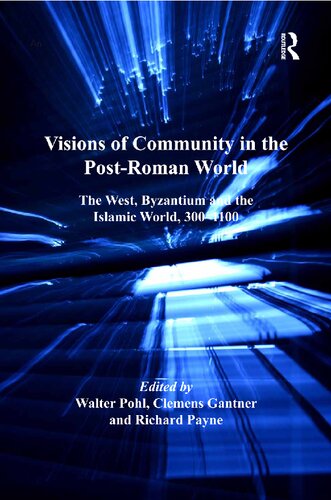(Ebook) Visions of Community in the Post-Roman World: The West, Byzantium and the Islamic World, 300–1100 by Walter Pohl (editor), Clemens Gantner (editor), Richard Payne (editor) ISBN 9781409427094, 1409427099
This volume looks at 'visions of community' in a comparative perspective, from Late Antiquity to the dawning of the age of crusades. It addresses the question of why and how distinctive new political cultures developed after the disintegration of the Roman World, and to what degree their differences had already emerged in the first post-Roman centuries. The Latin West, Orthodox Byzantium and its Slavic periphery, and the Islamic world each retained different parts of the Graeco-Roman heritage, while introducing new elements. For instance, ethnicity became a legitimizing element of rulership in the West, remained a structural element of the imperial periphery in Byzantium, and contributed to the inner dynamic of Islamic states without becoming a resource of political integration. Similarly, the political role of religion also differed between the emerging post-Roman worlds. It is surprising that little systematic research has been done in these fields so far. The 32 contributions to the volume explore this new line of research and look at different aspects of the process, with leading western Medievalists, Byzantinists and Islamicists covering a wide range of pertinent topics. At a closer look, some of the apparent differences between the West and the Islamic world seem less distinctive, and the inner variety of all post-Roman societies becomes more marked. At the same time, new variations in the discourse of community and the practice of power emerge. Anybody interested in the development of the post-Roman Mediterranean, but also in the relationship between the Islamic World and the West, will gain new insights from these studies on the political role of ethnicity and religion in the post-Roman Mediterranean.
*Free conversion of into popular formats such as PDF, DOCX, DOC, AZW, EPUB, and MOBI after payment.


